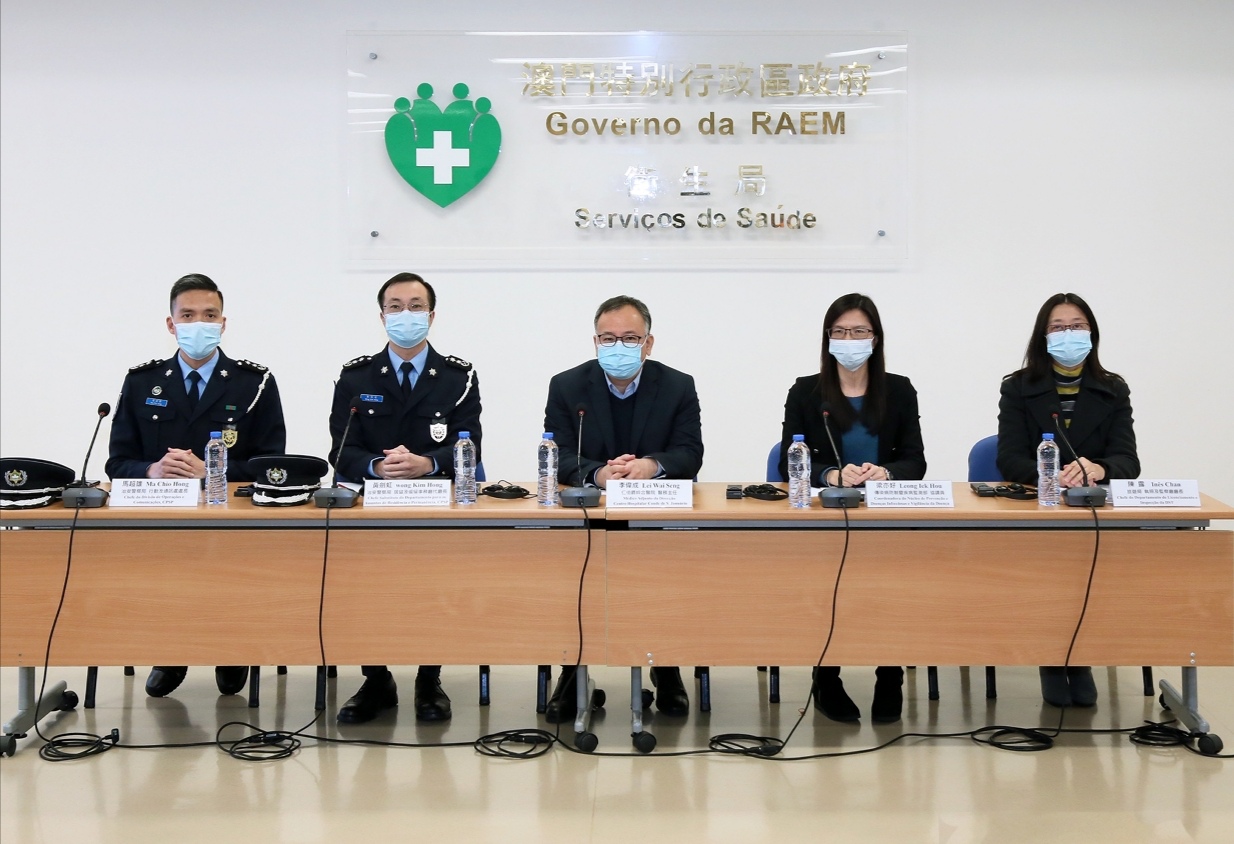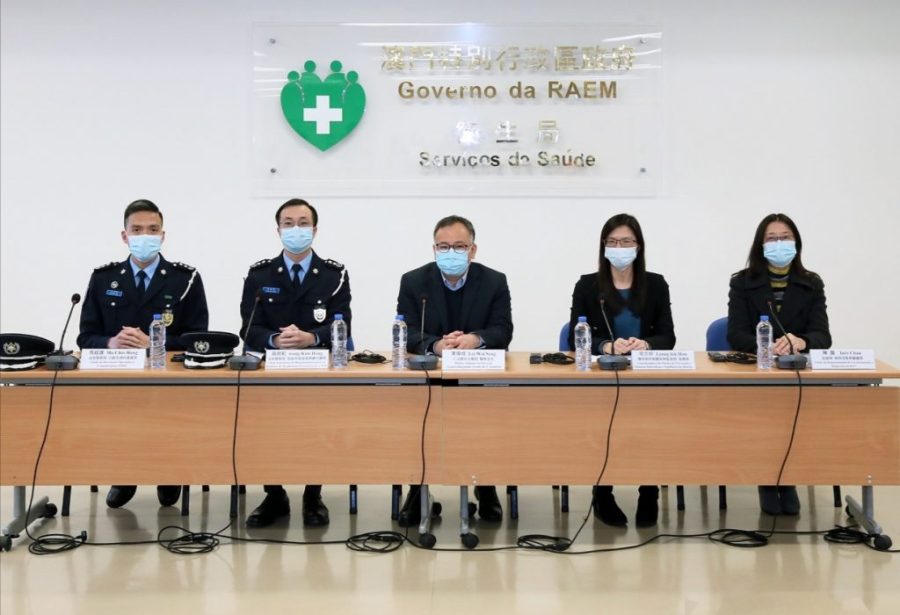Addressing Tuesday’s daily press conference about Macau’s novel coronavirus pneumonia (COVID-19) situation, Lei Wai Seng, clinical director of the public Conde de São Januário Hospital Centre, said that with no new COVID-19 cases having been confirmed in Macau for two weeks does not mean that the epidemic in the city is over, warning that there may be “hidden” cases which only carry mild symptoms in some neighbourhoods so the city was still facing a threat from the virus.
Lei urged residents not to let their guard down and keep up all the necessary preventive measures with the aim of enabling the current “stable” situation to continue.
Lei made the remarks on Tuesday evening at the Health Bureau (SSM) adjacent to the public hospital, when replying to a question by a reporter of Japan’s NHK, who asked whether the fact that no new COVID-19 cases have been confirmed in Macau for 14 consecutive days meant that the epidemic in the city had “come to an end”.
“Although we [Macau] have not recorded [any] confirmed cases for 14 consecutive days, it does not mean that the epidemic [in the city] is completely over. Instead, there is still a risk,” Lei said.
“We are very worried that there are some cases which [only] carry mild symptoms in our community, resulting in the continued spread of the virus,” Lei said.
“New cases are constantly confirmed in neighbouring regions so that we [the local government] will not let our guard down,” Lei said, urging residents not to let their guard down despite there being no new COVID-19 cases confirmed in Macau for a fortnight.
“We [the local government] don’t think that the epidemic [in Macau] has come to an end,” Lei said, adding that the city’s public medical institutions and frontline medical staff continued to be “highly” vigilant against the viral threat.
‘Measures have prevented community outbreak’
Meanwhile, Lei, one of the three clinical directors of the public hospital, also said that the fact that no new COVID-19 cases have been confirmed in Macau for two weeks was due to the government’s string of measures since early last month against the viral threat. He made the remarks in reply to another question by the same reporter who asked the reason for Macau’s success in tackling the COVID-19 menace.
Lei noted that the local government has implemented various measures against the viral threat since early last month – when it became aware of the emergence of the novel coronavirus, adding that all the measures have “only one aim”, the early detection of COVID-19 cases in Macau. “We put confirmed cases [patients] in the [public hospital’s] isolation ward for treatment right away, and put those who had close contact with confirmed patients under close medical surveillance, so as to stop the spread of the virus,” Lei said.
Lei said that alongside the ongoing changes in the epidemic in Macau and elsewhere, the local government has been implementing a host of measures with the “only aim” of preventing the occurrence of a community outbreak in Macau.
Lei noted that Macau has so far confirmed 10 COVID-19 cases, comprising imported cases and cases in which locals were infected with the disease, adding that Macau “is not as lucky this time as” in 2003 when it recorded only one SARS case. Lei said that the government’s measures have been successful so far in preventing a community outbreak, again urging residents to avoid complacency.
Macau’s last two COVID-19 cases, the 9th and 10th cases, were confirmed on February 4. Among the 10 COVID-19 patients, five have meanwhile been discharged from hospital. The 10 cases comprise seven tourists from Wuhan and three locals.
8,759 patacas for 14-day quarantine for migrant workers
During Tuesday’s press conference, Inês Chan Lou, who heads the Licensing and Inspection Department of the Macau Government Tourism Office (MGTO), said that non-resident workers who have been on the mainland 14 days before their intended entry into Macau but cannot go into 14 days of quarantine in Zhuhai – for instance, those who have arrived in Macau by air – will have to go into the quarantine in the Pousada Marina Infante hotel in Cotai for a fee of 8,750 patacas.
The government announced on Monday that non-resident workers who have been on the mainland 14 days before their intended entry into Macau will have to stay under medical surveillance for 14 days in a place in the adjacent city of Zhuhai arranged by the health authorities there and then obtain a health certificate issued by the Zhuhai health authorities confirming that they are not infected with the novel coronavirus before they will be allowed to enter Macau.
According to Monday’s announcement of the new measure, those who intend to enter Macau but cannot obtain the required health certificate – for instance, those who have arrived in Macau by air – will have to remain under medical surveillance for 14 days in a place in Macau arranged by the local health authorities, and pay for their accommodation and meals.
According to Chan, those who have completed the 14-day quarantine in the Pousada Marina Infante hotel will have to directly pay the hotel when they complete the quarantine and check out.
5 Macau residents on Diamond Princess to join HK charter flight
Meanwhile, the government’s Novel Coronavirus Response and Coordination Centre announced in a statement on Tuesday that the five Macau residents on the Diamond Princess cruise ship – which has been docked off the coast of Yokohama in Japan for around two weeks – will be taken on a charter flight back to Hong Kong arranged by the Hong Kong government.
The Hong Kong government is arranging two charter flights to Tokyo to bring home more than 300 Hong Kong people who have been quarantined on the ill-fated vessel for around two weeks. They are expected to return to Hong Kong tomorrow, public broadcaster RTHK has reported.
According to Hong Kong media reports, 542 passengers, including about 50 Hong Kong people, on the ship were diagnosed with COVID-19 until Tuesday, accounting for 15 per cent of the some 3,700 passengers and crew members on board.
(The Macau Post Daily/Macau News)
PHOTO © Government Information Bureau (GCS)






